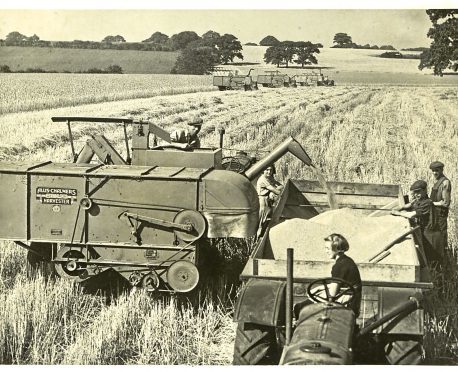Orange Allis Chalmers combines were once a common sight in the harvest fields of Britain but it’s now 45 years since the last of them were available at dealer forecourts.
Allis Chalmers – a huge manufacturing concern of more than just agricultural equipment – had purchased the Rumley concern in 1931 and with it the designs of Rumely combines. These machines were large affairs more suited to the North American prairies and so AC sought to bring mechanised harvests to the smaller farms in the east.
This led to the launch of the trailed All Crop combine in 1936 and imports to the UK soon followed, prior to and during World War II. These little combines often paired with AC’s new little tractor, the Model B, allowed the smaller mixed farms of eastern America and the UK to be more efficient at harvest time.
The All Crop took its name from the ability to harvest all the different cereal crops and further ranges of seed-bearing legume, herbage and brassica crops. It was a very important Lease Lend import which helped to secure wartime harvests in Britain’s time of need.
Allis had an import and assembly facility at Totton near Southampton but by 1951 the company was operating out of the former British Minneapolis Moline subsidiary Sale Tilney’s factory at Essendine near Stamford. It was this year that the first British built All Crop 60s were made available. Production of this super little bomb proof combine lasted until 1960.
By this time AC had been manufacturing self-propelled combines at Essendine since 1957. In 1955 AC had purchased another combine concern when they bought the Gleaner Baldwin company in Kansas. That company had been founded by the three Baldwin brothers who were of Scots descent. One, Curtis, had spent many hours feeding threshing mills and had believed the double handling of straw was wasteful especially since the threshed straw was just burned on the prairies.
This belief had set him and his brothers out on a topsy-turvy career manufacturing harvesting equipment.
Allis’s purchase gave it a recognised range of self-propelled combines which were the forerunners to their own range of orange AC combines to be assembled in the UK.
In 1956 AC tested one of the Gleaner Baldwin Model A combines in England and Scotland before assembly commenced at Essendine in 1957. Forty machines in kit form minus the engines were assembled with 20 sold into the home market and 20 exported.
These UK-built machines were fitted with either Perkins P6 diesel or Austin Newage TVO engines with some small changes made to suit UK conditions. As with the Gleaner Baldwin range they were turned out with silver galvanised steel panels. An orange UK version of the AC combines was produced in time for the 1958 harvest and bore the name of the EA Gleaner. This was followed by the Super A and the Model C Gleaner.
Allis was serious about a UK range of machinery having bought out the Jones Baler concern in Wales in 1961.
Essendine was also producing the famous Allis Chalmers Roto Baler and a series of British Allis Chalmers tractors. During the 1960s AC offered several improved models of combine with the famous rounded styling giving way to the squarer look which was first used on the Super A and C Gleaners. However by the end of the decade high output combines from continental Europe were hurting sales, despite the AC combine’s ability to produce tremendous samples of threshed grain.
Coupled with the failure of the Allis Chalmers ED40 tractor and the poor showing of its latest 5000 combine, AC sold its UK agricultural machinery operation to Bamford in 1971.
Bamford phased out combine production soon after and agricultural machinery manufacture ceased at Essendine.
Only the construction side of Allis remained active before it became part of a joint Fiat Allis venture in 1974. Production of plant and machinery at Essendine continued before the factory was closed down in 1985.
Allis Chalmers itself did not survive the downturn in agriculture in the early 1980s and in 1985 the West Allis plant produced its last tractor.
However an old link to harvesting is kept alive today in the AGCO name whose initials stand for Allis Gleaner Corporation.
